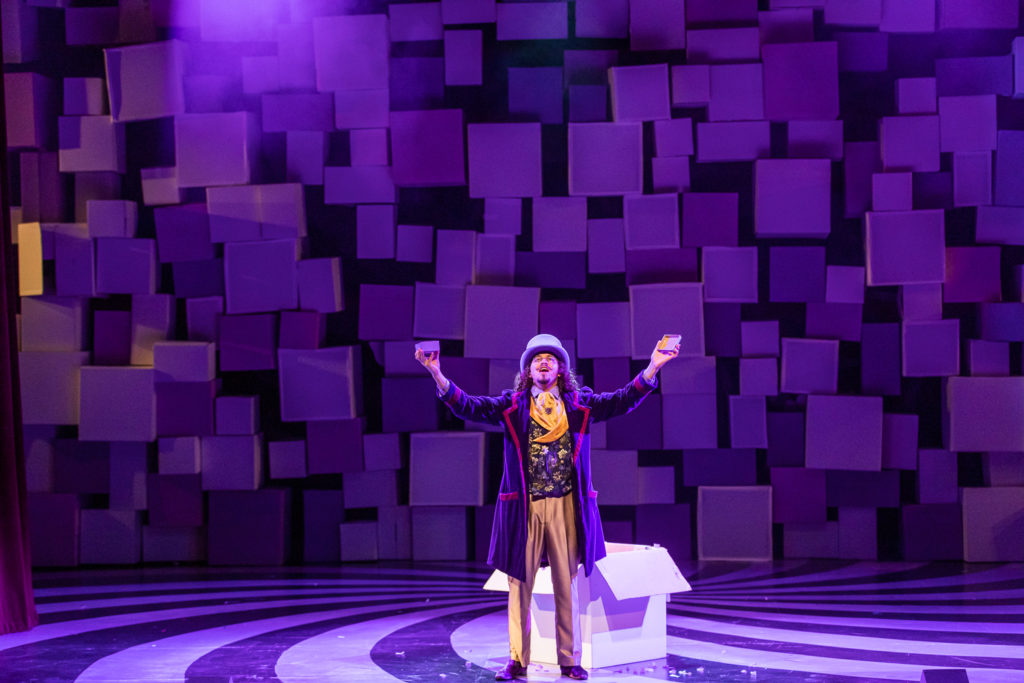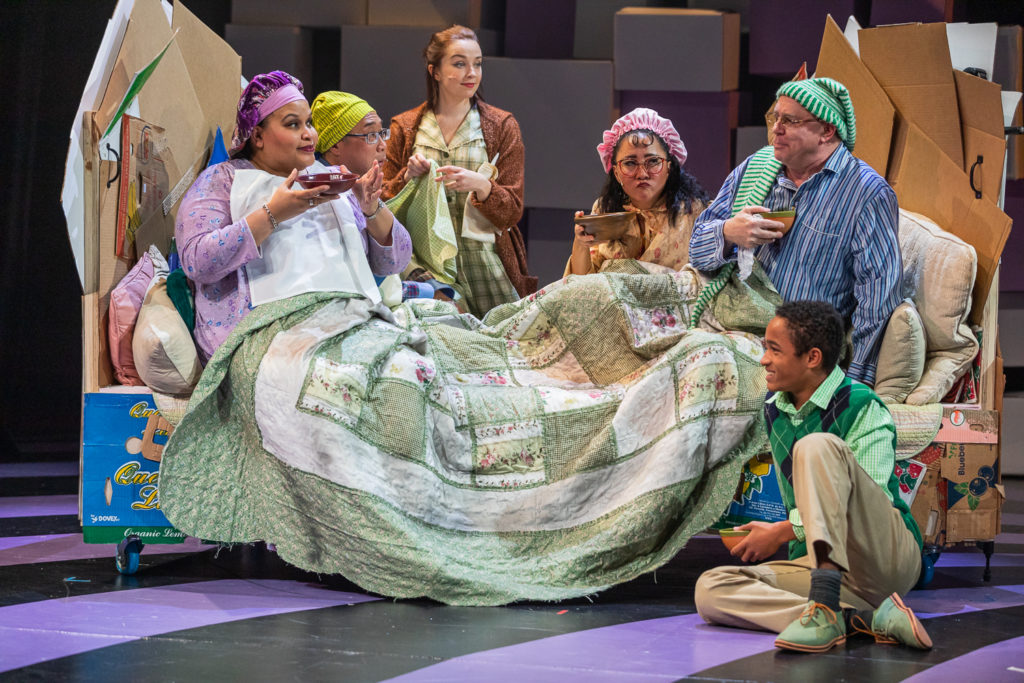
Photo by Nile Scott.
Presented by Wheelock Family Theatre
Music and lyrics by Leslie Bricusse and Anthony Newly
Adapted for the stage by Leslie Bricusse and Timothy Allen McDonald
Based on the book, Charlie and the Chocolate Factory by Roald Dahl
Directed by Emily Ranii
Music directed by Nathan Urdangen
Choreographed by Russell Garrett
Oct 25 – Nov. 17, 2019
Boston University
200 Riverway
Boston, MA 02215
Wheelock on Facebook
Critique by Kitty Drexel
(Boston, MA) Wheelock Family Theatre’s production of Roald Dahl’s Willy Wonka (2004) should not be confused with the West End and Broadway production of Charlie and the Chocolate Factory (2013). Charlie and the Chocolate Factory is currently touring in the US (now in Omaha!). Roald Dahl’s Willy Wonka is not. Both incorporate elements from Dahl’s novel and the two Hollywood movies. They are similar but not the same.
Roald Dahl’s Willy Wonka cannot compete with the novel or the movies. Fans of the other Wonka media should view this iteration as the children’s theatre it is and not compare it to its source materials. They will be disappointed.
This 2005 article from The Guardian, “Roald Dahl and Willie Wonka” by Ayesha Christie was written around the time the Tim Burton movie hit movie theaters. It’s a primer on Willy Wonka lore. It mentions Dahl’s disappointment that actor Spike Milligan wasn’t cast in the 1971 film with Gene Wilder. Dahl didn’t like that the movie focused too much on the Wonka character and not enough on Charlie. Wilder was later disappointed in the 2013 remake. A remake that Felicity Dahl, Roald Dahl’s widow and executor of his estate, vetted and preferred.
This history leads us to Wheelock’s production currently playing at the Boston University Riverway campus. Roald Dahl’s Willy Wonka does not put the focus on Charlie as Dahl would have preferred. It instead casts Wonka (Ricardo “Ricky” Holguin) as the musical’s miraculous, MIT grad student looking, extroverted hero. He’s a chaotic neutral man who cheerfully narrates himself into the musical’s misadventures inside and outside of the Wonka factory. This differs greatly from the novel’s infamously agoraphobic anti-hero with white savior tendencies.
Charlie Bucket (Jamie Leslie) and the Bucket family live in extreme poverty just like Dahl wrote. Their circumstances are the direct consequence of a broken capitalist system: Mr. Bucket (Matthew Zahnzinger) works full-time for what one can only assume is minimum wage. Mrs. Bucket (Lisa Kate Joyce) is out of work and caring for their parents at home. Rent, healthcare, food, utilities and education costs mean that the Bucket family is living far below the poverty line. They do not receive government assistance that we know of – nor would we because discussing such things is still taboo. Their only shot at survival out of a society that demands they pull themselves up by their bootstraps is delivered by divine intervention: Wonka manipulates Charlie into his factory. The rest, as they say, is history.
Leslie Bricusse and Anthony Newly have written some clever ditties for the cast. The songs are cute but not memorable. The book by Bricusse and Timothy Allen McDonald is necessarily altered to assist in storytelling for a young audience. They’ve abbreviated the deeper lessons regarding the consequences of bad behavior to explain that humanity exists on a spectrum of fluctuating morality. We’re all pursuing happiness and some of us will go to great lengths to grasp that happiness.

Photo by Nile Scott.
Roald Dahl’s Willy Wonka’s dialogue scenes lack shaping. The big moments such as Charlie’s exciting discovery of his golden ticket, the anticipation of seeing Wonka in front of the factory, the anxiety of getting caught with the Fizzy Lifting potion, or even the triumphant ending don’t lack tension leading up to their big moment. The audience is left in confused disappointment because we expected an emotional build-up and didn’t get it.
The songs are shaped because they are written that way. As aided by music director Urdangen and the score, all songs have clear beginnings and endings and satisfying action in between.
For this reason, it was easier to enjoy the vocals than the acting. Both were great but diminished because the show wasn’t constructed to reveal the casts’ strengths. The adult cast, almost all Wheelock regulars, did deliver some stellar performances but it was despite the inadequecies of the overall production.
Children who are in the process of learning the craft of acting won’t be critiqued in my articles. They deserve the space and time to discover their strengths. I will give it to them.
Director Emily Ranii says in her program note that that the message behind Roald Dahl’s Willy Wonka is “Be Kind.” I disagree. Charlie is no paragon of humanity; he is just a better person than Wonka’s other guests. His saving grace is his unflappable, gullible belief that positive thinking alone will manifest a better reality. It was Charlie’s behavior at the end of his tour of the factory that changed his family’s fate. He did the right thing and was finally, after all of his family’s mistrials, rewarded.
The message I took from this musical is that children emulate the behavior of their parents. Greedy, lazy, selfish adults are more likely to raise children who exhibit those traits. Willy Wonka saw his guests for their bad behavior, took them at face value, set booby traps, and patiently waited for their downfalls. It’s not right but it’s funny. Rather than look for a moral in Roald Dahl’s Willy Wonka, enjoy it for the schadenfreudic entertainment that it is.
